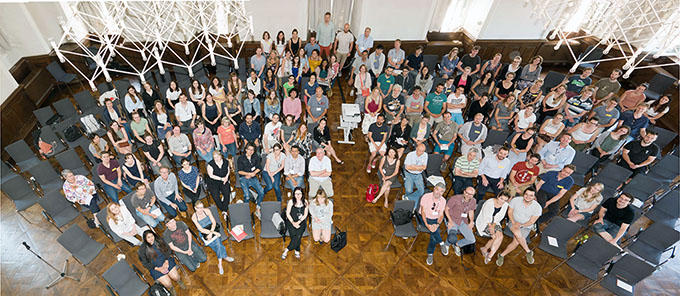IZN Retreat in Heidelberg
The gut brain axis in health and disease
On July 1-2, 2018 the annual retreat of the Interdisciplinary Center for Neuroscience of the University of Heidelberg (IZN)took place at the monastery Schöntal. 146 people from 37 IZN Research Groups including 35 Major Neurosciencestudents from Heidelberg attended. The event was sponsored by the SFB1134, the German Society of Neurogastroenterology and Motility(DGNM) and endorsed by the European Society of Neurogastroenterology and Motility(ESNM). This was the first IZN Retreat dedicated to neurogastroenterology and the gut brain axis organised by Beate Niesler, IZN Principle Investigator since 2017.
On Sunday July 1, the IZN Retreat was opened by the IZN Director Hilmar Bading giving an introduction and update on the IZN, its activities and the program of the retreat. The first speaker Michael Schemann from the TUM Munich, Germany, gave an excellent introduction into the ENS and its function. This was followed by a talk of Vassilis Pachnis form the The Francis Crick Institute in London, UK, who focussed on the development of the ENS and shared latest research data. After a nice and sunny open air lunch within the monastery garden, one had the opportunity to attend a guided tour of the monastery, stroll a bit around or go on a canoe tour on the river Jagst. Everyone met again for an open air dinner and the evening lecture was given by Emeran Mayer from the UCLA, Los Angeles USA, who reported on the paradigm shift in neuroscience based on recent research data of the microbiota gut brain axis. After an outstanding talk and a lively discussion, everyone gathered for drinks and the poster session where 44 posters were presented by young investigators.

On Monday morning the meeting went on with a talk by Beate Niesler, IZN Heidelberg, on dissecting the genetics of a prototypical gut brain disorder: irritable bowel syndrome and introducing GENIEUR, the Genes in Irritable Bowel Syndrome Research Network Europe. Lukas van Oudenhove from the KU Leuven, Belgium, gave insight into brain imaging and assessing gut brain disorders relevant brain structure, circuits and function. Discussions went on during the coffee break and later on Stefanie Kürten from the University of Erlangen reported on gastrointestinal changes within CNS disorders with a focus on Multiple Sclerosis. Lunch was served at 13:00 after the PI meeting and PhD meeting.
Within the afternoon session, new IZN members, all Chica and Heinz Schaller Research Group Leaders, gave insights into their research topics: Annarita Patrizi, Amid Agarwal and Claudio Acuno. This was followed by the IZN award ceremony. The IZN-Students Poster Prize was awarded to Diego Benusiglio of Valery Grinevich’s team for his poster entitled: ‘Sensory-driven activation of oxytocin neurons during social interaction’. The Foundation BrainAid IZN Master’s Award 2018 was given to
Melina Castelanelli for her Master Thesis on ‘Evaluation of neuronal optogenetic manipulation in
vitro and in freely moving mice’. Last not least, the IZN / Chica and Heinz Schaller Young Investigator Neuroscience Awardwas handed over to Max Richter, PhD student of Ulrike Müller, the thesis of whom was published in the EMBO Journal.
In conclusion, this was a timely event that was highly appreciated and rated as outstanding by Hilmar Bading within his concluding remarks. He furthermore encouraged the master students to step into the area of gut brain disorders. We are looking forward to building upon this first gut brain axis event and developing this research area further in Heidelberg.
Beate Niesler, Professor at the Institute of Human Genetics at the Heidelberg University and Head of the Research Group Genetics in Neurogastroenterologic Disorders within the IZN Heidelberg